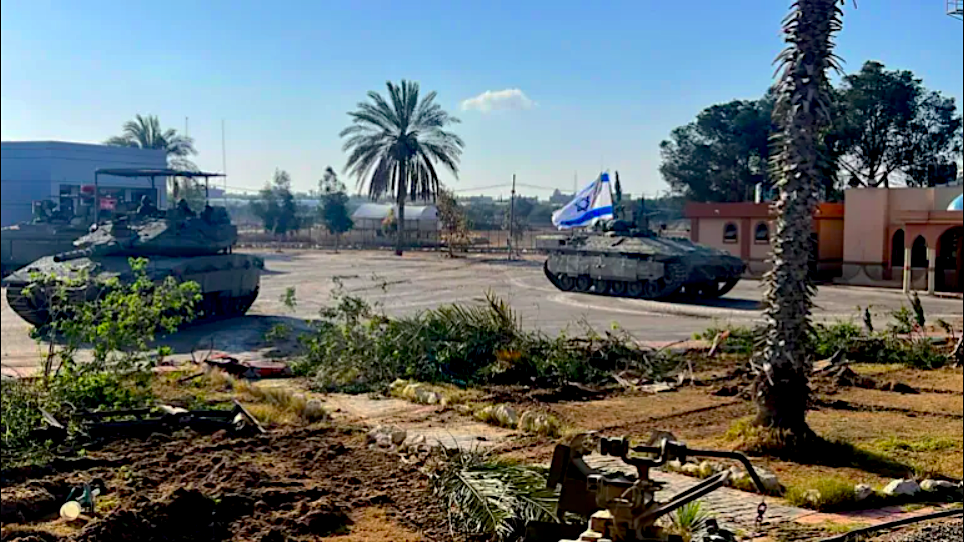
Published 10/05/2024 15:35 | Edited 05/10/2024 17:19
The Israeli military intensified its attacks in Rafah, in southern Gaza, while paralyzing humanitarian aid operations across the Palestinian territory, as ceasefire talks ended without agreement.
Rafah was the last refuge for civilians, as the Israeli government itself corralled the population of 1.5 million people into this city on the southern tip of Gaza, under the promise of security. As a result, people have nowhere to go as the southern border with Egypt remains closed under Israeli control. Before the war, Rafah had 275,000 inhabitants.
The United Nations Relief and Works Agency for Palestinian Refugees in the Near East (UNRWA) said on Friday that 110,000 Palestinians had fled Rafah. Israeli troops were advancing in the east of the city in hand-to-hand combat operations and conducting airstrikes. People fleeing wander aimlessly through the desert trying to escape bombings and gunfire.
“People are petrified. People have feared this for a long, long time and now it’s upon us. There are constant bombings. There is smoke on the horizon. There are people on the move,” said Sam Rose, director of planning at UNRWA, from Rafah. He said Israel was subjecting Gaza to a “medieval siege” in a “scorched earth” war.
Israeli forces earlier this week took control of the Rafah border crossing, sealing off the crucial entry point for humanitarian aid.
“No aid has reached Gaza since Sunday. No help, no fuel, no supplies, nothing. And now we are really down to our last reserves,” said Rose.
“We have a few more days of flour we can supply. But everything else will start to stop very soon, no fuel, no water. So the situation is really desperate,” she added.
Israel has already defied international objections by sending tanks and conducting what it called “selective strikes” in eastern Rafah, the city it says is home to the last remaining Hamas battalions. But Hamas officials in Rafah dismissed Israel’s description of its operation as “limited” as “nothing more than lies.”
Under heavy attacks, patients and staff were forced out of hospitals in Rafah, leaving many sick and injured Palestinians beyond treatment. An Israeli airstrike on two houses in the Sabra neighborhood of Rafah killed at least 12 people, including women and children.
“Al-Najjar Hospital is out of service. And the Kuwait Hospital [em Rafah] it is only for trauma and emergencies,” said Palestinian doctor Mohammed Zaqout. “We don’t have beds or hospitals to refer [as pessoas]especially for critically ill patients.”
Further north, witnesses reported airstrikes and fighting in neighborhoods of Gaza City, targeting Zeitoun, Sabra, Nassr, Tal al-Hawa and the Shati refugee camp.
Israeli and Hamas delegations left the Egyptian capital, Cairo, after the latest round of ceasefire negotiations, mediated by Qatar, the United States and Egypt. Hamas said on Friday that “the ball is now completely” in Israel’s hands.
Egypt’s Foreign Ministry said the two sides must show “flexibility” in order to reach an agreement on a ceasefire and an exchange of prisoners held in Gaza for Palestinian prisoners.
Hamas said a deal would involve the withdrawal of Israeli forces from Gaza, the return of Palestinians displaced by the war and the exchange of captives for prisoners, with the aim of a “permanent ceasefire”.
The group said it stands by the terms and that Israel “raised objections to it on several core issues.”
Hamas’ demand for an initial 12-week pause in fighting was a major obstacle for Israel during this week’s ceasefire negotiations, broadcaster CNN reported, citing three sources familiar with the negotiations.
Israel is determined to press on with its offensive on Rafah, defying warnings from the UN and its allies, including its main military and political backer, the US.
Although US President Joe Biden warned that he would stop US arms supplies to Israel if it carried out the ground attack, Prime Minister Benjamin Netanyahu remained defiant. “If we have to be alone, we will be alone. If we need to, we will fight with our fingernails. But we have much more than nails”, he said in an interview on Thursday (9).
US Secretary of State Antony Blinken is expected to present a report to Congress later on Friday on Israel’s conduct in Gaza, which stops short of concluding that the country violated terms for the use of US weapons. , according to the American press.
On Friday, the UN General Assembly will vote on a resolution that would grant new “rights and privileges” to Palestine and call on the UN Security Council to favorably reconsider Palestine’s request for full membership.
Most of the 2.3 million Palestinians in the Gaza Strip are displaced in Rafah, in the southern part of the enclave, but hundreds of thousands also live in tents in other areas.
Source: vermelho.org.br

